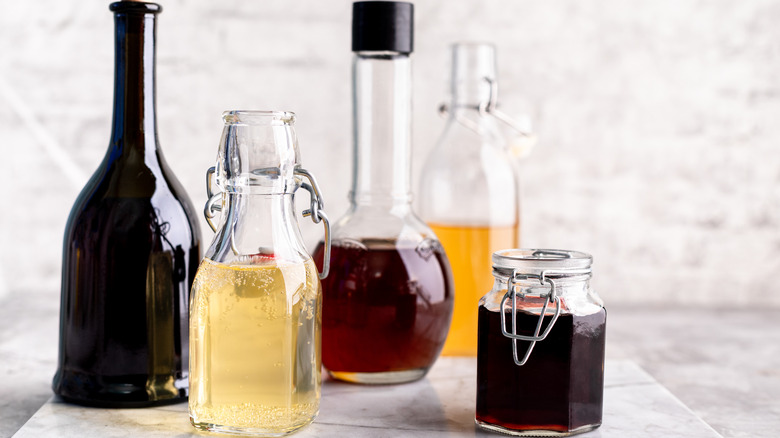Why Ina Garten Never Stores Vinegar In The Pantry
Ina Garten is not a by-the-book kind of celebrity chef and she isn't afraid to do things differently. The Barefoot Contessa showed the publishing world that sometimes it's okay to color outside the proverbial lines. Garten told The Hollywood Reporter, "When I decided to do cookbooks, the popular thing at the time was these enormous books of 250 recipes — how to cook everything. I wanted a book of 75 great recipes, like one really good roast chicken." And the powers that be know how much we all love Garten's roast chicken recipe. But not everyone was on board. Garten continued, "My publisher didn't get it. People were skeptical because it was so different from what was being done. I kept my vision, and, fortunately, they stuck with me."
Garten also does things a little differently when it comes to the ingredients she uses. Garten is known for making her own vanilla extract, yet the culinary queen also understands the convenience of store-bought ingredients. Her catchphrase over the years has become, "Store bought is fine" (via The Cut). Per Bon Appétit, Garten even confesses she uses Rao's marinara sauce instead of making her own because sometimes even celebrity chefs like to make a quick meal. So, fans may not be surprised to learn Garten doesn't store her vinegar in the seemingly conventional spot in her kitchen many others do.
Garten keeps it cool
According to Food & Wine, Ina Garten doesn't keep her vinegar in the pantry cupboard, instead, she stores it in the refrigerator. The culinary icon also revealed that she keeps a wide variety of vinegar stocked. She told the publication, "And I keep them in the fridge. I know a lot of people keep them in the pantry. I might take hell for this, but I just find that they don't develop bacteria in the fridge."
Of course, per Preserve and Pickle, vinegar becomes vinegar because of acetic acid-making bacteria, but before you shun Garten's vinegar storing preference, My Recipes doesn't disagree with her. The cooking site explains that some vinegars that aren't stored in a cool, dark place can start to lose the integrity of their flavor because warmer temperatures allow for the bacteria to continue to ferment. But they don't advocate for all vinegars taking up space in your fridge. Instead, they suggest you taste your vinegar. If it is a super acidic vinegar, you can store it at room temperature without concern over flavor changes. However, those balsamic and wine vinegars that are a little milder, may keep better in your refrigerator.

